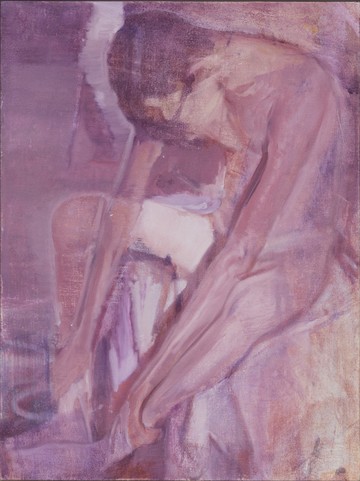Vistamare presents a project that brings together three artists, Rosa Barba (1972, Agrigento, Italy) Maria Loboda (1979, Krakow, Poland) and Polys Peslikas (1973, Limassol, Cyprus). The installation explores intersections in their work, such as the ability to build narratives blending reality and fiction.
Barba’s practice merges films, sculptures, installations, live-performances and text pieces that are grounded in the material and conceptual qualities of cinema. Film and language/signs are explored in their capacity to simultaneously be an immaterial carrier of meaning and a physical material with sculptural properties.
Loboda’s practice resembles the writing and rewriting of extraordinary stories, which she manipulates to bring to life. Through the reorganization of found and invented forms, she creates a unique form of contemporary archaeology, generating new associations by restaging old symbols.
Peslikas’ intimate figures, often drawn from photographs and altered through cutting, cropping, and collaging, become visual palimpsests. The canvases, layered with rich textures and hues, are shaped by the ritual repetition of gestures, inviting a reflective pause.
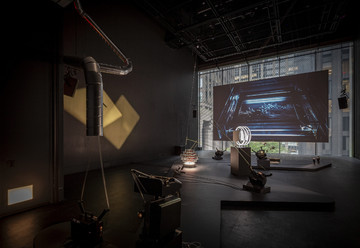
Installation view of Rosa Barba: The Ocean of One’s Pause, Kravis Studio at The Museum of Modern Art, New York, 2025. Photo: Peio Erroteta © Rosa Barba
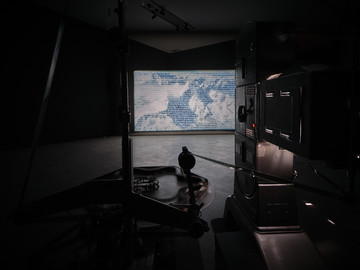
Exhibition view
Rosa Barba, Meaning Distances, MSU, Black Box, Zagreb, 2025
Photo: Damir Žižić ©Rosa Barba
Rosa Barba
Aggregate States of Matters, 2019
35mm film, color, optical sound; 21:14 min
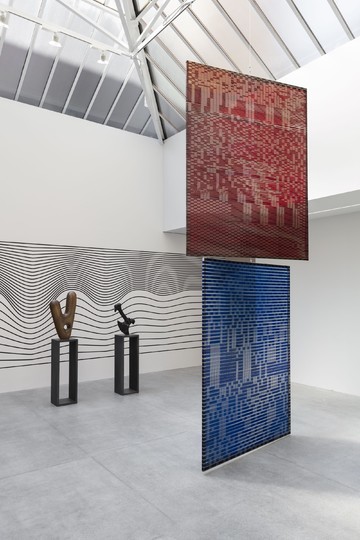
Le voci della sera, installation views, Vistamare, Milano, 2022. Courtesy the artist and Vistamare Milano/Pescara. Photo Andrea Rossetti

Steel, acrylic, aluminium, LED lights, motor, 35mm film
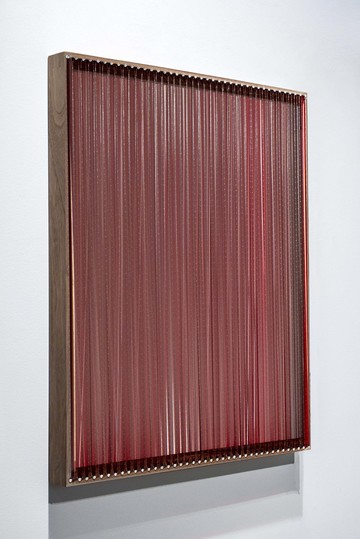
16mm red film, nails and walnut frame
Rosa Barba (Born in Italy. Lives and works in Berlin, Germany)
Rosa Barba’s artistic practice navigates between various dichotomies, exploring themes of permanence versus impermanence, reality versus fiction, and the interplay of language and time. Through films, sculptures, installations, and performances, she investigates how space is shaped by temporal and linguistic constructs, challenging linear narratives and traditional semiotics. Barba deconstructs cinematic elements to examine the intersections of physical materials like projectors and celluloid with abstract concepts like time, space, and sound. Her work often focuses on natural landscapes and human interventions, blurring the lines between historical record, personal narrative, and artistic representation. Her work is part of numerous international collections and her forthcoming and recent solo exhibitions include: Calouste Gulbenkian Museum, Lisbon (2026), MAXXI, Rome, (2025), MoMA, New York, (2024, 2025), MALI Museum, Lima, Peru (2024), Boijmans Museum, Rotterdam (2024), Centre Pompidou, Paris (2023), Tate Modern, London (2023), PICA, Perth Australia (2023), Villa Medici, Rome (2022), Neue Nationalgalerie, Berlin (2021-2022), and at Biennials such as the 53rd and 56th Venice Biennale, Sao Paolo (2016), Sydney (2014) and Performa (2013). She was awarded the Calder Prize in 2020, and the International Prize for Contemporary Art, of the Fondation Prince Pierre de Monaco (2015).
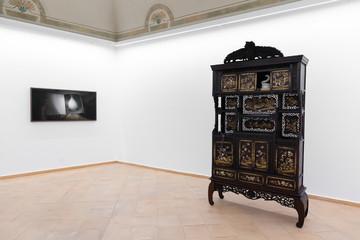
Maria Loboda. Ours to keep, installation view, Vistamare, Pescara, 2024. Photo Roberta Verzella
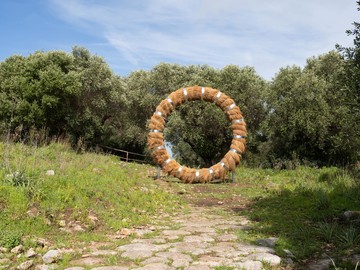
Maria Loboda, “To separate the sacred from the profane”, 2016. Steel, wood, polystyrene, marsh grass, variable dimensions. Installation view at HYPERMAREMMA, Archaeological Park of the Ancient City of Cosa, Ansedonia, 2025. Photo Daniele Molajoli
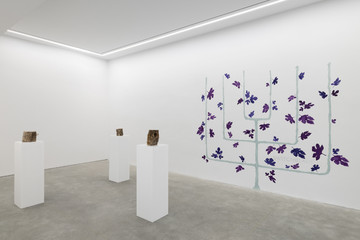
Maria Loboda. Faux, installation view, Vistamare, Milano, 2023. Photo Andrea Rossetti
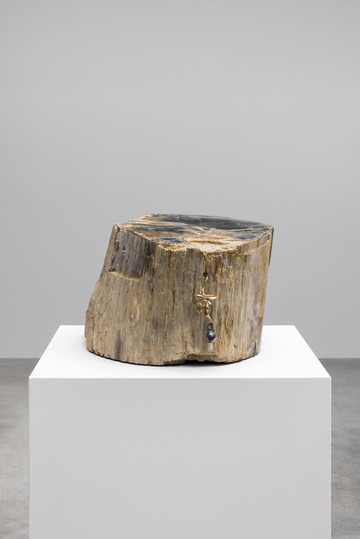
Petrified wood, real black pearl, gilded brass
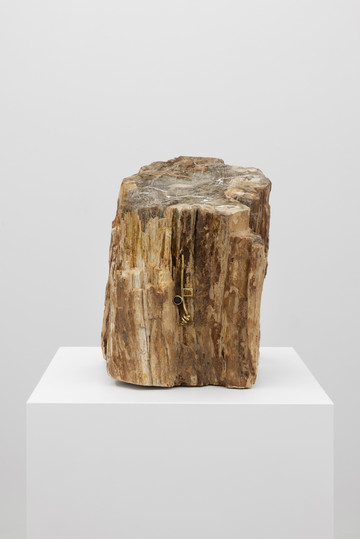
Petrified wood, real Citrine, real Moldavite, gilded brass
Maria Loboda (1979, Krakow, Poland) composes installations and sculptures to investigate cultural codes, pictorial signs and the grammar of different materials and objects. Her works include references to endless cultural deposits: history, poetry, art, philosophy, literature, anthropology, linguistics, science, folklore and alchemy, as well as various aspects of spirituality and transcendence in the wider sense. Her research stems from these fields and results in a formal equation of language and materiality. Through the deconstruction and reorganization of found objects and symbols, Loboda has become a unique voice in what might best be described as contemporary archaeology which creates completely new interpretations and associations by rearranging signs and restaging old symbols. Her wide-ranging exhibition activities encompass the 58th Venice Biennale (2019), Taipei Biennial (2014), and documenta13 (2012). Important solo exhibitions include Senckenberg Museum for Natural History, Frankfurt (2023), Schirn Kunsthalle, Frankfurt a.M. (2018/19), Ujazdowski Castle Centre for Contemporary Art, Warsaw (2019), Kunsthalle Basel (2017), Institut d’art contemporain, Villeurbanne (2017), The Power Plant, Toronto (2016), and Reina Sofia, Madrid (2013). She is the first recipient of the Otilie Röderstein grant from the Hessian Ministry of Education in 2022. Loboda lives and works in Krakow and Berlin.
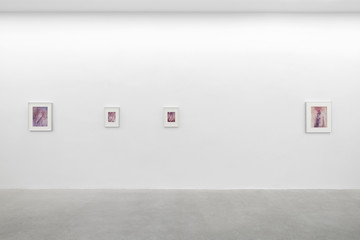
Polys Peslikas, Obsidian, installation view, Vistamare, Milan, 2023. Photo Andrea Rossetti
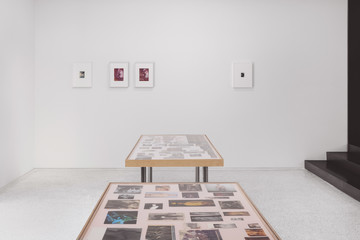
Polys Peslikas, This Delusive Sentiment, installation view, Arch, Athens, 2023
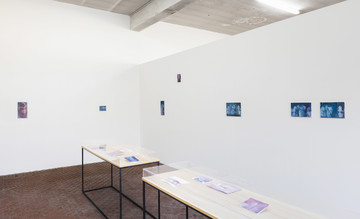
Polys Peslikas, Reenactments (Bacchus), installation view, ICA Milano, 2022. Photo Andrea Rossetti
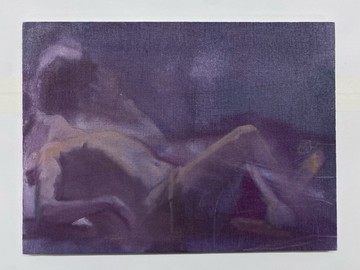
Oil on canvas mounted on wood
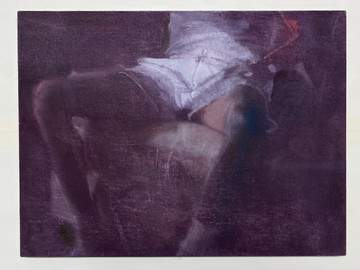
Oil on canvas mounted on wood
Polys Peslikas (Limassol, Cyprus) lives and works between London and Nicosia.
Polys Peslikas work explores possibilities of representational painting, by means of textured surfaces in which figurative fragments are caught in a constant state of flux. The works are composed of multiple layers of various tones of colors. Layer after layer, the surface becomes the site of a ritualistic repetition of gestures. He paints after having observed and examined other paintings, artworks, and objects he has a fascination for. Peslikas maily accesses the works via reproduction, which he scans and prints, cuts and assembles into different combinations, meticulously, to a point that it almost impossible to trace them back to their source.
Among recent shows: Arch, (Athens), Radio Athènes (Athens), Mackintosh Lane (London), Vistamare (Milan), Villa Medici (Rome), Shanaynay (Paris), NiMAC (Nicosia), Halle 14 (Lipsia) Prague Biennale ll. In 2015/16 he had a residency at the Künstlerhaus Bethanien, Berlin. In 2017 he represented Cyprus at the 57ª Biennale di Venezia.
Vistamare is a contemporary art gallery based in Milan and Pescara.
Founded in Pescara in 2001 by Benedetta Spalletti in her hometown, the gallery aims to create a welcoming space for artists and to stimulate a dialogue based on meetings and sharing. The gallery space in Pescara is located inside an eighteenth-century historic palace, with nine rooms featuring frescoed vaults, where temporary exhibitions interact with remaining site-specific artworks made over the years, testifying the strong relationships built with the artists, from Ettore Spalletti to Joseph Kosuth, from Mimmo Jodice to Haim Steinbach.
In 2018, Benedetta Spalletti opened a space in Milan together with Lodovica Busiri Vici. The current gallery space is located inside a courtyard of an Art Nouveau building in Porta Venezia, featuring three exhibition halls designed to offer artists a space to express their projects and ideas. The central hall is dominated by a large skylight that floods the space with natural light and is complemented by two symmetrical and specular rooms.
Over more than 20 years of activity, the gallery has built relationships with curators, collectors, and institutions to promote the work of its artists.
The gallery aims to develop a program of research and experimentation, exploring the variety and the complexity of contemporary art languages: from video to sculpture and painting, from photography to performance. Vistamare has presented exhibitions of established artists alongside often dialogic exhibitions of artists from different generations, such as Rosa Barba, Mario Airò, Sara Enrico, Armin Linke, and Anna Franceschini. The gallery has brought Tom Friedman and Claudia Comte to Milan for the first time, artists who have since become part of its roster, and whose work has become an integral part of Vistamare’s bold and often forward-thinking approach.
Since 2022, the Milan space has started a series of in-depth studies named “Focus On,” centered on the research of emerging artists from the Italian and international scene, invited to exhibit for the first time with projects specifically conceived for the gallery’s space.

